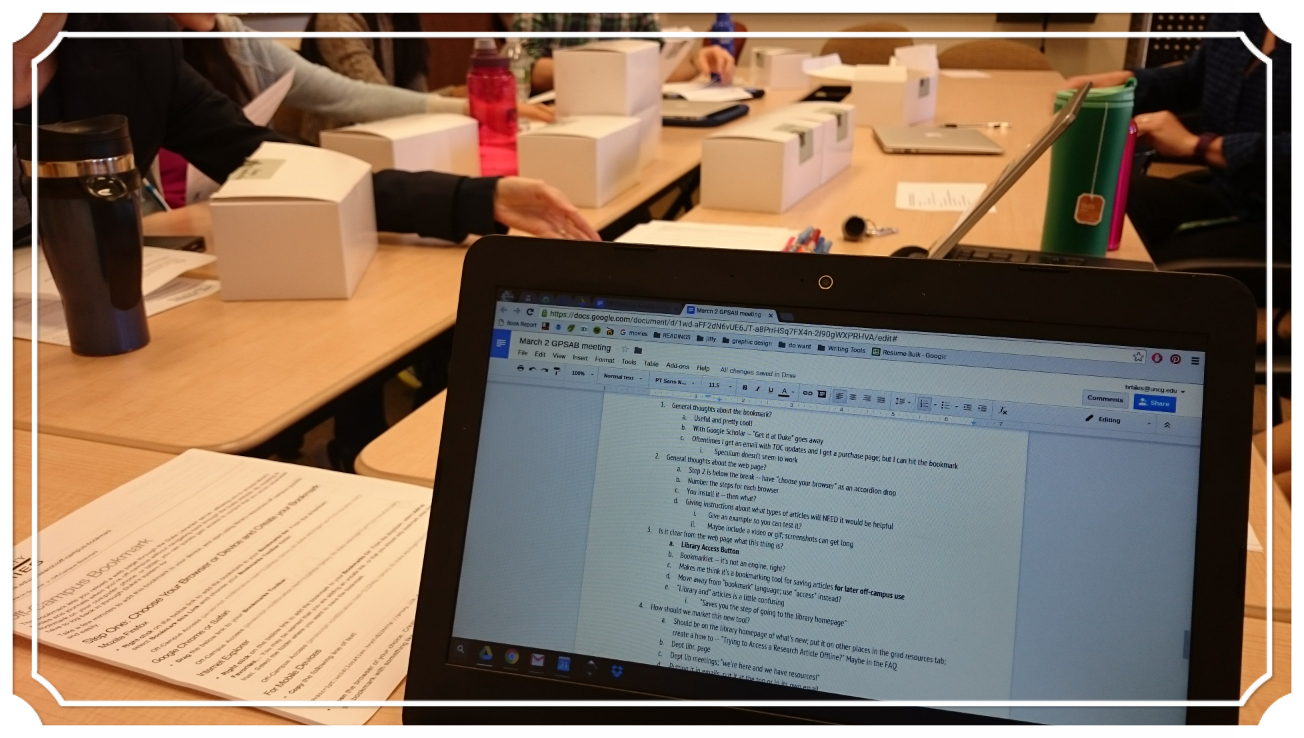Week Seven: Leading
Hannah Hiles | 4 March 2016 | Durham NC
This week had several tests of leadership (and many more of support). Up to this point, I've committed myself to several roles: observer, supporter, and producer. This week, I was given two opportunities to take on a new role, and I, hesitantly, took it.
A brief side-note about hesitance. My supervisor offered me the opportunity to lead part of a meeting with the library's graduate student advisory board – a group of students who are selected to help lead the library in more progressive and useful ways. I've been working on a tool for the library, a proxy bookmarklet an off-campus access button that lets students get to journals and articles without logging in. While I didn't write the code for the tool, I did create the web page for it, as well as draft the instructions (and re-draft, and re-re-draft).
My supervisor offered me the chance to lead the discussion on if the tool worked, if the students liked it, what they didn't like. And I said no.
And I pretty much immediately regretted it. I may have been imagining things, but I think I saw a hint of disappointment cross my supervisor's face. Over the weekend, she sent me her notes for the meeting, and I let her know that I'd given it more thought (true) and that I wanted to run the discussion.
Which I did – and which I loved.
So what was with the hesitance, and what was with the immediate regret? I think some part of my brain, the one that is responsible for my imposter syndrome, was screaming, “No! You're not ready yet!” And I was actually listening to it. But as soon as I let that part of my brain take the wheel and pass on running the discussion, the rational part of brain started to kick in with a, “You fool, of course you're ready! You totally have this!”
Hesitance, meet regret.
So I ran the workshop, which went well. Then yesterday, I worked as a “facilitator” in a 30-ish group of faculty in the library. A large (very large) piece of research was done university-wide about services the library provides it's faculty. This sort of round-table discussion was about breaking into small groups, looking at this massive pile of data in easy-to-digest pieces, and saying, “OK – now what?” We created “actionable items” and looked at where problems were in the data – where people said they wanted one thing in the publishing world, but didn't act on what they wanted (or support it, for that matter). Where it seemed like some departments were more progressive in those models than others, or tenured faculty were more knowledgeable than non-tenured (a data indicator that may be more about age than tenure status).
This role was more about steering direction. I took notes along with another librarian, who served to guide the conversation and give far more suggestions than I did. My role was to keep our group from getting too caught up in the flashiness and impressiveness of the data interface, and to instead look at our wedge of information and ask the question of “What do we do with this?”
In the first instance of leadership, I was an immediate bundle of nerves. But with this, I wasn't – I felt immediately relaxed and confident in my ability to help the faculty talk about these issues and come up with ideas for how to better their university. And I think that we're on our way towards doing that with this data.
It's n=1, but it would seem that I'm getting more confidant in these leadership roles as they come to me after all.

